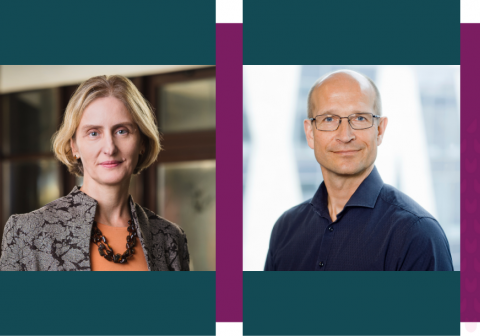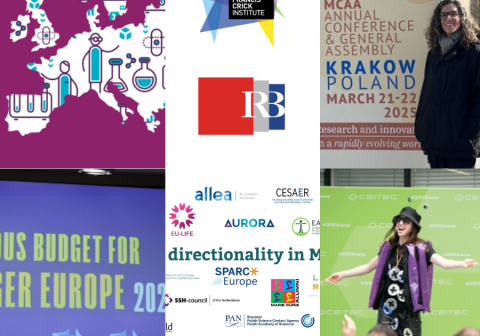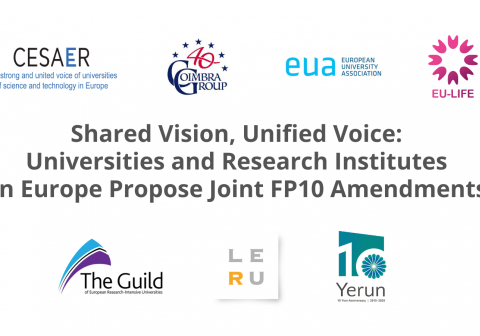Pooling EU-LIFE expertise to boost ERC applicants’ confidence
Members of the EU-LIFE Grants and Funding Strategies working group organised recently an online ERC Master Class aimed at ERC starting and consolidator applicants from EU-LIFE research institutes.
Some of the organisers shared their motivation to provide this type of event to researchers, as well as the added value of organising it in the framework of the EU-LIFE alliance.
“The ERC is a highly prestigious grant allowing researchers to establish or consolidate their own independent team. ERC provides substantial funding over a long-term period of 5 years, which is quite unique in the European funding landscape. It allows researchers to make high-risk high-gain strategic choices which are of crucial importance not only for their own research career but also to prepare Europe for future challenges!
Obtaining an ERC grant is also extremely competitive, and we see unfortunately many excellent projects that do not get funded. Therefore, it is extremely crucial to support researchers when applying for ERC Grants, learning from the expertise of grant officers, previous grantees and panel members from their institutes.”
Said Cristina Bartocci PhD, Scientific writer, Institut Curie
“A few EU-LIFE institutes have been organising this type of training individually for several years, but we see an important added value of organising this at a EU-LIFE Masterclass level! It allows us to pool the knowledge and experience of ERC grant officers, panel members and grantees from across all EU-LIFE centres. We clearly see the added value at several levels:
1. Applicants get access to a much larger pool of experts than at their institutes alone, which in turn helps them receiving valuable insights from a broad range of people;
2. EU-LIFE grant officers can learn from each other’s training ‘style’ and get insight into the type of support provided to ERC candidates, thus advancing their own training and experience;
3. It contributes to foster a culture of sharing best practices and collaboration among the EU-LIFE institutes, as researchers and experts from different career levels and fields are brought together each with their own experience and vision in the context of successful ERC applications.”
Said Lieve Ongena PhD, Sr Science Policy & International Grants Manager, VIB
The event was structured around a panel discussion with ERC Scientific Council members Geneviève Almouzni and Nektarios Tavernarakis about the goals of ERC, and a pitch session where applicants got to discuss their project with ERC panel members and grantees. This pitch session was the most appreciated and most highly valued by participants, as they received critical but constructive feedback on the outline of their research proposal. The programme also included training sessions on topics such as general structure of an application, evaluation process, and project budget.
We interviewed two of the participants to find out what they gained from the EU-LIFE ERC Master Class, and also what ERC means to them as scientists.
Leila Akkari PhD, Junior Group Leader, The Netherlands Cancer Institute (NKI), Oncode Institute, said:
“The training was extremely useful to provide both general overviews of the requirements of an ERC proposal, and give specific examples of how to construct innovative projects that will stand out in the many proposals submitted, by giving clear examples of dos and don’ts that can make a project stand out and be appreciated as creative. The key aspect of this training was the interactive nature of it, where we were encouraged to participate and especially, it provided a very useful platform to discuss proposal ideas and how to present them with members of the ERC panels and grantees that reflected back with us on their successful applications and shared their feedback on our own projects to perfect it. We also got the chance to hear from ERC panel chairs on the process of selection, and the ERC council member on the overarching goal of the organization. Such internal insights and guidance were instrumental in responding to both our very practical questions on how to prepare our proposal, but also to appreciate the larger purpose of the organization and shape our ideas in its fundamental core according to it, to enrich science with the best ideas and best people.
ERC holds a meaning of recognition and prestige, a stamp of excellence and innovation we all strive for as scientists. I personally would see becoming an ERC grantee as a validation of my scientific contributions and further encouragement to pursue our cutting-edge science, with the funding support to extend our goals and increase our reach. It is a mark of excellence and trust, which fuels inspiration both for the grantees and the next generation of scientist they train.”
Spyridon Chavlis PhD, Institute of Molecular Biology and Biotechnology, Foundation for Research and Technology - Hellas (IMBB-FORTH), Computational Neuroscience Team, Poirazi Lab, said:
“During EU-LIFE ERC Master Class, I had the opportunity to learn about the ERC structure from people that actively review ERC proposals. Thus, our guidance focused on all aspects that will transform any grant into a winning grant application. They also helped us understand how to choose the panel carefully, and the discussion about finances was constructive. Furthermore, when we presented our main idea in front of ERC panellists, it was beneficial. Compared to other presentations about grant proposals that I have participated in, EU-LIFE ERC Master Class was more focused, well organized, and very targeted. In my opinion, the scientific community needs many classes like ERC Master Class, as one of the most competitive domains in our jobs is the writing of proposals.
I have conducted my PhD studies in a laboratory holding an ERC Starting Grant. I quickly realized that ERC is the best opportunity any early career stage researcher has to pursue their dreams and conduct research at the highest level. ERC is a stable scheme, and although it is highly competitive, the overall success rate is higher than other famous grant schemes. In addition, ERC is open to researchers from any nationality, considering it one of the most inclusive grant organizations. Overall, ERC grants, especially the Starting Grant, are crucial to pursuing in-depth, state-of-the-art, high-quality research; it is continuously helping early-career stage scientists worldwide.”



